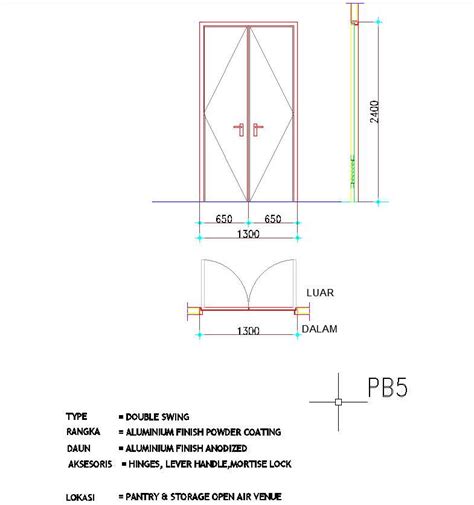How To Show Door Swing In Elevation
Ronan Farrow
Apr 02, 2025 · 3 min read

Table of Contents
How to Show Door Swing in Elevation Drawings: A Comprehensive Guide
Showing door swings accurately in elevation drawings is crucial for effective communication in architecture and construction. A clear depiction prevents costly mistakes during the building process. This guide will walk you through various methods and best practices to ensure your elevations are precise and easy to understand.
Understanding the Importance of Accurate Door Swing Representation
Elevation drawings are essentially two-dimensional representations of a building's exterior walls. They illustrate the heights, widths, and overall appearance from a specific viewpoint. Correctly showing door swings is critical because it:
- Prevents construction errors: A misrepresented swing can lead to doors being installed incorrectly, obstructing pathways, or interfering with other building elements.
- Enhances clarity: Clearly indicated swings improve understanding for contractors, clients, and other stakeholders involved in the project.
- Improves communication: Visual representations are far more effective than written descriptions in conveying spatial relationships.
Methods for Showing Door Swing in Elevation Drawings
Several techniques can effectively illustrate door swings in elevations. The choice depends on your preference and the complexity of the project.
1. Simple Arc Representation
This is the most straightforward approach. A simple arc, drawn outwards from the door's edge, indicates the direction of the swing.
- Pros: Simple, quick, easy to understand.
- Cons: Less precise, might not accurately convey the extent of the swing, especially for wide doors or doors opening outwards.
Example: A short, curved line extending from the door's edge, pointing to the left, clearly shows a leftward swing.
2. Detailed Arc with Swing Radius
For more precision, include the radius of the door swing. This is particularly useful for wider doors or those opening into tight spaces. The radius helps determine potential obstructions and ensures adequate clearance.
- Pros: Greater precision, clearly shows the extent of the swing.
- Cons: Slightly more time-consuming to draw.
3. Plan View Insertion
For complex scenarios or where multiple doors are close together, incorporating a small plan view of the door and its swing within the elevation can be very helpful. This mini-plan acts as a detailed close-up.
- Pros: Very clear, handles complex scenarios effectively.
- Cons: Requires more drawing space.
4. Using Arrows and Labels
Employing arrows and labels to indicate the swing direction enhances clarity, especially when using other methods. Label the swing direction explicitly (e.g., "Swing Out," "Swing In," "Left Swing").
5. Digital Software Advantage
Architectural CAD software (like AutoCAD or Revit) offers tools for creating accurate door swing representations. Many programs automatically generate swing arcs based on door specifications, simplifying the process.
Best Practices for Clear Elevations
Regardless of your chosen method, following best practices ensures easy understanding:
- Consistency: Maintain a consistent style for depicting door swings throughout the entire set of elevations.
- Clarity: Make the swing indications clearly visible and not obscured by other drawing elements.
- Scale: Ensure the swing representation is accurately scaled to match the rest of the elevation.
- Annotation: Include notes specifying the swing direction (inward or outward) and any relevant clearances.
- Legend: A legend defining your swing notation system can be very useful, especially for larger projects.
Conclusion
Accurately portraying door swings is an essential aspect of creating effective elevation drawings. By employing these methods and best practices, you can significantly improve the clarity and accuracy of your architectural designs, minimizing errors and ensuring smooth communication throughout the construction process. Remember that clear communication is key to successful project execution.
Featured Posts
Also read the following articles
| Article Title | Date |
|---|---|
| How To Start Up Salt Water Pool | Apr 02, 2025 |
| How To Sue A Nursing Home | Apr 02, 2025 |
| How To Put Out Corn For Deer | Apr 02, 2025 |
| How To Relight A Pilot Light In A Furnace | Apr 02, 2025 |
| How To Straighten Outboard Skeg | Apr 02, 2025 |
Latest Posts
-
How Far Can A Parent Move With Joint Custody Wv
Apr 04, 2025
-
How Far Can A Buck Smell Doe Urine
Apr 04, 2025
-
How Far Can A 7mm 08 Shoot
Apr 04, 2025
-
How Far Can A 2x4 Truss Span Without Support
Apr 04, 2025
-
How Far Away Is The Beach
Apr 04, 2025
Thank you for visiting our website which covers about How To Show Door Swing In Elevation . We hope the information provided has been useful to you. Feel free to contact us if you have any questions or need further assistance. See you next time and don't miss to bookmark.
